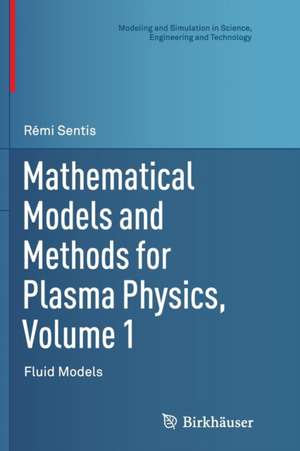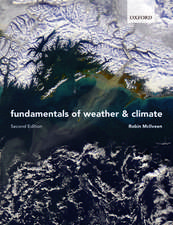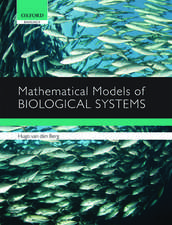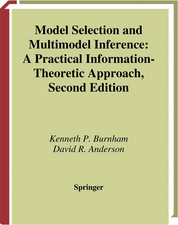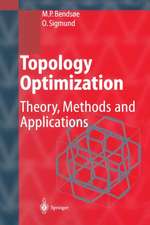Mathematical Models and Methods for Plasma Physics, Volume 1: Fluid Models: Modeling and Simulation in Science, Engineering and Technology
Autor Rémi Sentisen Limba Engleză Paperback – 23 aug 2016
First and foremost, this book mathematically derives certain common fluid models from more general models. Although some of these derivations may be well known to physicists, it is important to highlight the assumptions underlying the derivations and to realize that some seemingly simple approximations turn out to be more complicated than they look. Such approximations are justified using asymptotic analysis wherever possible. Furthermore, efficient simulations of multi-dimensional models require precise statements of the related systems of partial differential equations along with appropriate boundary conditions. Some mathematical properties of these systems are presented which offer hints to those using numerical methods, although numerics is not the primary focus of the book.
| Toate formatele și edițiile | Preț | Express |
|---|---|---|
| Paperback (1) | 638.24 lei 6-8 săpt. | |
| Springer International Publishing – 23 aug 2016 | 638.24 lei 6-8 săpt. | |
| Hardback (1) | 644.49 lei 6-8 săpt. | |
| Springer International Publishing – 13 feb 2014 | 644.49 lei 6-8 săpt. |
Din seria Modeling and Simulation in Science, Engineering and Technology
-
 Preț: 410.88 lei
Preț: 410.88 lei - 18%
 Preț: 958.38 lei
Preț: 958.38 lei - 18%
 Preț: 784.13 lei
Preț: 784.13 lei - 15%
 Preț: 551.02 lei
Preț: 551.02 lei - 15%
 Preț: 642.68 lei
Preț: 642.68 lei -
 Preț: 392.60 lei
Preț: 392.60 lei -
 Preț: 388.34 lei
Preț: 388.34 lei - 18%
 Preț: 950.03 lei
Preț: 950.03 lei - 15%
 Preț: 643.84 lei
Preț: 643.84 lei - 15%
 Preț: 649.39 lei
Preț: 649.39 lei - 15%
 Preț: 644.18 lei
Preț: 644.18 lei - 20%
 Preț: 651.57 lei
Preț: 651.57 lei - 18%
 Preț: 1238.42 lei
Preț: 1238.42 lei - 15%
 Preț: 639.25 lei
Preț: 639.25 lei -
 Preț: 399.12 lei
Preț: 399.12 lei - 15%
 Preț: 650.19 lei
Preț: 650.19 lei -
 Preț: 387.58 lei
Preț: 387.58 lei -
 Preț: 392.97 lei
Preț: 392.97 lei -
 Preț: 396.24 lei
Preț: 396.24 lei - 15%
 Preț: 661.32 lei
Preț: 661.32 lei -
 Preț: 396.24 lei
Preț: 396.24 lei - 18%
 Preț: 943.88 lei
Preț: 943.88 lei - 18%
 Preț: 1386.17 lei
Preț: 1386.17 lei - 15%
 Preț: 648.42 lei
Preț: 648.42 lei - 15%
 Preț: 648.24 lei
Preț: 648.24 lei -
 Preț: 405.06 lei
Preț: 405.06 lei - 15%
 Preț: 641.38 lei
Preț: 641.38 lei - 15%
 Preț: 649.71 lei
Preț: 649.71 lei - 18%
 Preț: 1220.88 lei
Preț: 1220.88 lei - 15%
 Preț: 640.06 lei
Preț: 640.06 lei - 18%
 Preț: 952.26 lei
Preț: 952.26 lei - 15%
 Preț: 640.88 lei
Preț: 640.88 lei -
 Preț: 383.50 lei
Preț: 383.50 lei - 18%
 Preț: 1232.26 lei
Preț: 1232.26 lei - 15%
 Preț: 644.49 lei
Preț: 644.49 lei - 15%
 Preț: 655.60 lei
Preț: 655.60 lei -
 Preț: 400.26 lei
Preț: 400.26 lei - 23%
 Preț: 657.15 lei
Preț: 657.15 lei
Preț: 638.24 lei
Preț vechi: 750.88 lei
-15% Nou
Puncte Express: 957
Preț estimativ în valută:
122.14€ • 127.05$ • 100.84£
122.14€ • 127.05$ • 100.84£
Carte tipărită la comandă
Livrare economică 15-29 aprilie
Preluare comenzi: 021 569.72.76
Specificații
ISBN-13: 9783319376820
ISBN-10: 3319376829
Pagini: 252
Ilustrații: XII, 238 p. 16 illus., 11 illus. in color.
Dimensiuni: 155 x 235 x 13 mm
Greutate: 0.36 kg
Ediția:Softcover reprint of the original 1st ed. 2014
Editura: Springer International Publishing
Colecția Birkhäuser
Seria Modeling and Simulation in Science, Engineering and Technology
Locul publicării:Cham, Switzerland
ISBN-10: 3319376829
Pagini: 252
Ilustrații: XII, 238 p. 16 illus., 11 illus. in color.
Dimensiuni: 155 x 235 x 13 mm
Greutate: 0.36 kg
Ediția:Softcover reprint of the original 1st ed. 2014
Editura: Springer International Publishing
Colecția Birkhäuser
Seria Modeling and Simulation in Science, Engineering and Technology
Locul publicării:Cham, Switzerland
Cuprins
Chapter 1. Introduction. Some Plasma characteristic quantities.- Chapter 2. Quasi-neutrality. Magneto-hydrodynamics.- Chapter 3. Laser propagation. Coupling with ion acoustic waves.- Chapter 4. Langmuir waves and Zakharov equations.- Chapter 5. Coupling electron waves and laser waves.- Chapter 6. Models with several species.- Appendix.- Bibliography.- Index.
Recenzii
From the book reviews:
“This work is an important bridge between mathematical rigor and practical application, useful for research and simulation experts needing to reevaluate their PDE analyses and assumptions for complex plasma systems. Applied mathematicians will also find this work to be a stimulating introduction to the riches of plasma physics, including the open problems discussed. Summing Up: Recommended. Graduate students through professionals/practitioners.” (T. Eastman, Choice, Vol. 52 (3), November, 2014)
“This work is an important bridge between mathematical rigor and practical application, useful for research and simulation experts needing to reevaluate their PDE analyses and assumptions for complex plasma systems. Applied mathematicians will also find this work to be a stimulating introduction to the riches of plasma physics, including the open problems discussed. Summing Up: Recommended. Graduate students through professionals/practitioners.” (T. Eastman, Choice, Vol. 52 (3), November, 2014)
Textul de pe ultima copertă
This monograph is dedicated to the derivation and analysis of fluid models occurring in plasma physics. It focuses on models involving quasi-neutrality approximation, problems related to laser propagation in a plasma, and coupling plasma waves and electromagnetic waves. Applied mathematicians will find a stimulating introduction to the world of plasma physics and a few open problems that are mathematically rich. Physicists who may be overwhelmed by the abundance of models and uncertain of their underlying assumptions will find basic mathematical properties of the related systems of partial differential equations. A planned second volume will be devoted to kinetic models.
First and foremost, this book mathematically derives certain common fluid models from more general models. Although some of these derivations may be well known to physicists, it is important to highlight the assumptions underlying the derivations and to realize that some seemingly simple approximations turn out to be more complicated than they look. Such approximations are justified using asymptotic analysis wherever possible. Furthermore, efficient simulations of multi-dimensional models require precise statements of the related systems of partial differential equations along with appropriate boundary conditions. Some mathematical properties of these systems are presented which offer hints to those using numerical methods, although numerics is not the primary focus of the book.
First and foremost, this book mathematically derives certain common fluid models from more general models. Although some of these derivations may be well known to physicists, it is important to highlight the assumptions underlying the derivations and to realize that some seemingly simple approximations turn out to be more complicated than they look. Such approximations are justified using asymptotic analysis wherever possible. Furthermore, efficient simulations of multi-dimensional models require precise statements of the related systems of partial differential equations along with appropriate boundary conditions. Some mathematical properties of these systems are presented which offer hints to those using numerical methods, although numerics is not the primary focus of the book.
Caracteristici
Centralizes results that were strewn in different research papers and inaccessible by physicists The derivations of some classical plasma models are explained from a mathematical point of view Rigorous asymptotic analysis tools are used to justify classical physical approximations Includes supplementary material: sn.pub/extras
